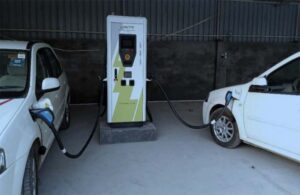Striving to achieve its self-made target of complete transition towards electric mobility, India has ramped up to establish new EV charging infrastructure all across the country.
 However, according to a recent claim of whitepaper published recently, India needs to set up 46,000 electric vehicle charging stations by 2030 to reach the global benchmark.
However, according to a recent claim of whitepaper published recently, India needs to set up 46,000 electric vehicle charging stations by 2030 to reach the global benchmark.
EV charger ratio is 6 both for China and the Netherlands, 19 for the US while it stands 135 for India. That means there is one charger per 135 EVs in India compared to 6 in China, the white paper by Alvarez and Marsal, a global professional services firm, stated.
The paper was launched at an electric vehicle conference, The EVConIndia 2022.
The paper highlighted some key challenges affecting EV charging adoption and talked about six key issues affordability, range anxiety, supply chain, product safety & quality, and inadequate access to financing.
With a large automotive industry and pollution issues, India is ripe for innovation and rapid adoption of EVs in times to come, it said.
Sub-segments of the industry can grow at a compounded average growth rate of 50-100 percent over the next five years if supply chain, product safety, product and battery innovation, EV charging infrastructure, and financing obstacles are removed, the paper suggested.
“We believe that if these issues can be addressed by a concerted effort by the industry along with the government support, India can potentially become one of the leading markets and manufacturing hubs globally for the EV segment.” Manish Saigal, Managing Director, Alvarez & Marsal India.
Speaking at the conference, Niti Aayog Adviser (Infrastructure Connectivity & Electric Mobility) Sudhendu J Sinha said, “We want to use these disruptive times to become the manufacturing hub of the world. We want to be leading exporter (nation) for EV components and batteries”.
Sinha further explained that to achieve that aspiration, “it is vital that the quality standards are top-notch, the businesses must have better control over the supply chain, and ethics should be the unshakable backbone of the industry”.

